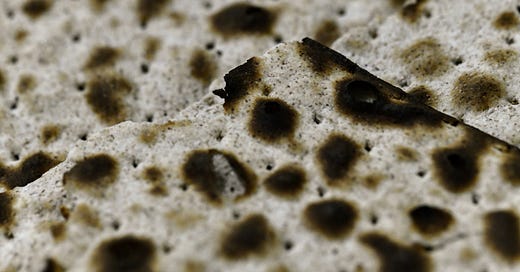Freedom of Speech
The seder teaches us that to attain freedom we must be fully engaged with life, and active self-expression plays a crucial role in that engagement.
Erev Pesach is an exceptionally busy time of year. So I just wanted to share a brief thought with you as we prepare for the Seder.
I believe there's a lesson to be learned from the fact that this year we transition directly from Pesach into Shabbat, as both holidays share the requirement of speech. Shabbat was established as a commemoration of the Exodus, which we often take for granted. However, upon deeper reflection, it is puzzling why Shabbat serves as a reminder of the Exodus.
To help understand this connection it’s helpful to look at the Rambam’s analogy between the requirements of Shabbat and Pesach in Hilchot Chametz U’Matzah 7:1.
מִצְוַת עֲשֵׂה שֶׁל תּוֹרָה לְסַפֵּר בְּנִסִּים וְנִפְלָאוֹת שֶׁנַּעֲשׂוּ לַאֲבוֹתֵינוּ בְּמִצְרַיִם בְּלֵיל חֲמִשָּׁה עָשָׂר בְּנִיסָן שֶׁנֶּאֱמַר (שמות יג ג) "זָכוֹר אֶת הַיּוֹם הַזֶּה אֲשֶׁר יְצָאתֶם מִמִּצְרַיִם" כְּמוֹ שֶׁנֶּאֱמַר (שמות כ ח) "זָכוֹר אֶת יוֹם הַשַּׁבָּת
It is a positive commandment of the Torah to relate the miracles and wonders wrought for our ancestors in Egypt on the night of the fifteenth of Nisan, as [Exodus 13:3] states: "Remember this day, on which you left Egypt," just as [Exodus 20:8] states: "Remember the Sabbath day."
The Rambam is explaining that, like Shabbat, we are commanded to remember and sanctify Pesach through speech. The Rambam understands that the connection between Shabbat and Pesach emphasizes the importance of articulation on both occasions. Just as Kiddush on Shabbat must be recited with speech and not just by drinking wine, articulation is also fundamental to the Pesach seder. Retelling the story of the Exodus on Pesach requires active self-expression through speech.
There are many other references to speech in the Exodus story and the Haggadah. The word Haggadah itself literally translates to the act of telling, relating, or declaring. According to Kabbalistic teachings, when we break down the Hebrew name for Passover, פֶּסַח Pesach, into two words - Peh-Sach - it translates to "speaking mouth." All of this emphasizes the significance of speech during this holiday. Perhaps there is no better description that encapsulates the theme for Passover, than the declaration we make during the seder:
אֲפִילוּ כֻּלָּנוּ חֲכָמִים כֻּלָּנוּ נְבוֹנִים כֻּלָּנוּ זְקֵנִים כֻּלָּנוּ יוֹדְעִים אֶת הַתּוֹרָה מִצְוָה עָלֵינוּ לְסַפֵּר בִּיצִיאַת מִצְרָיִם. וְכָל הַמַּרְבֶּה לְסַפֵּר בִּיצִיאַת מִצְרַיִם הֲרֵי זֶה מְשֻׁבָּח
And even if we were all sages, all discerning, all elders, all knowledgeable about the Torah, it would be a commandment upon us to tell the story of the exodus from Egypt. And anyone who adds and spends extra time in telling the story of the exodus from Egypt, behold he is praiseworthy.
This declaration highlights the central importance of, articulation, speaking, and asking questions during the seder. This aspect of the seder is so crucial that even if someone is alone on the night of the seder, they are still obligated to engage in dialogue and ask questions aloud.
Why is speech such an essential component of the Pesach holiday and the seder? When we consider it, I think speech is a crucial aspect of the freedom we celebrate during the Passover. Speech empowers us to express ourselves and communicate effectively. Simply being aware of the facts of the Exodus story would not be enough; we must articulate and convey the history, and what it means to us today. In my book, Bringing Order to the Seder, I explain that da'at, true knowledge, emerges from personal experience and an intimate connection with information. To achieve da’at we must do more than merely recite ancient history passively. We must be fully engaged in the story and fully engaged with life. Active self-expression is a critical component of that engagement.
The Torah expresses the mitzvah of having a seder as a mitzvah of articulation and relationship [Exodus, 13:8]
וְהִגַּדְתָּ֣ לְבִנְךָ֔ בַּיּ֥וֹם הַה֖וּא לֵאמֹ֑ר בַּעֲב֣וּר זֶ֗ה עָשָׂ֤ה יְהוָה֙ לִ֔י בְּצֵאתִ֖י מִמִּצְרָֽיִם
And you shall explain to your child on that day, ‘It is because of what God did for me when I went free from Egypt.’
V’higadita l’vincha means to relate to your children. This encourages us to form a connection with other people, events, and the story we tell, and pass that connection on to the next generation. Pesach reminds us that we can maintain the freedom we gained in Egypt only if we reject apathy and remain active participants, engaged in our lives, and in our relationships. The seder celebrates the enduring human spirit that refuses to become indifferent, which is ultimately the purpose of our God-given freedom of speech. Chag sameach!


